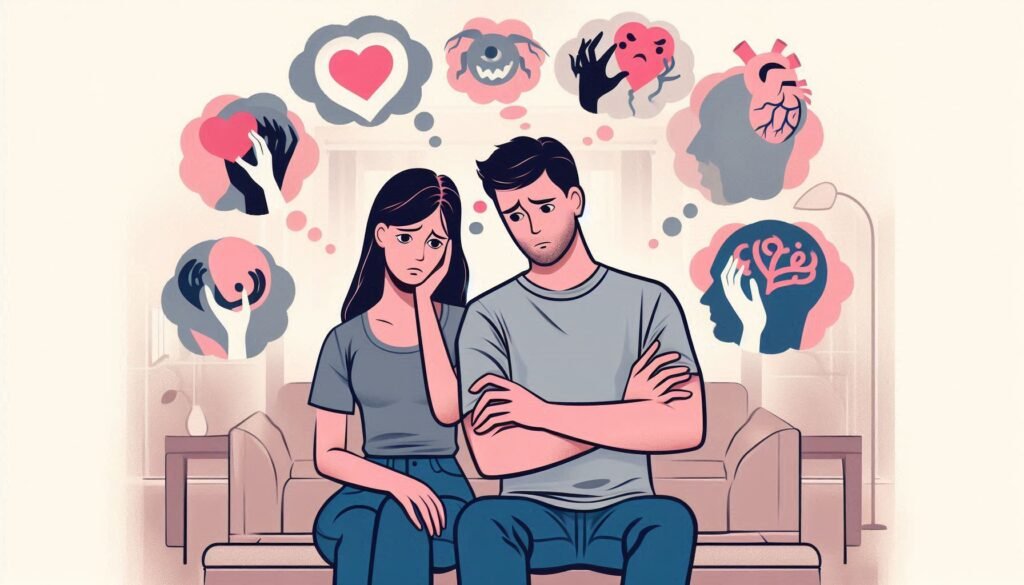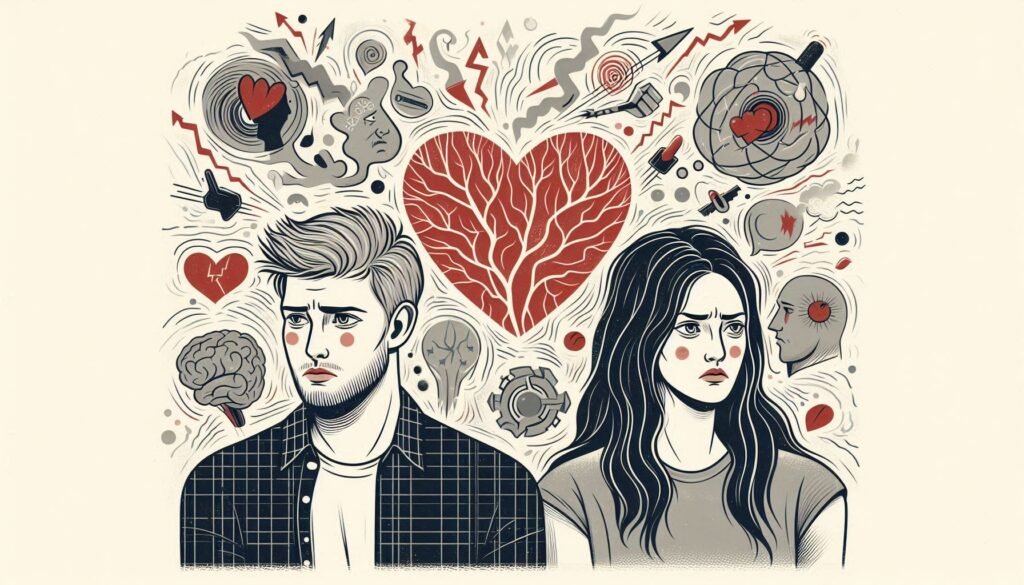Love is a complex tapestry woven from myriad emotions and expressions. Each thread represents how we connect with our partners, but what happens when neuroticism enters the mix? Neuroticism, characterized by anxiety, self-doubt, and emotional instability, can significantly influence how affection is expressed in relationships. Understanding this interplay is crucial for fostering deeper connections.
Imagine wanting to show love but feeling held back by insecurities or overthinking every gesture. For many individuals high in neurotic traits, affectionate behavior may be fraught with challenges. By exploring the dynamics of neuroticism and expressions of affection in relationships, we can better understand ourselves and our partners.
This article delves into how personality shapes our ability to express love authentically while addressing fears that could inhibit connection. Whether you’re navigating your own feelings or trying to comprehend your partner’s behaviors, there’s valuable insight ahead on enhancing intimacy amidst uncertainty. Let’s uncover the nuances of affection shaped by neurotic tendencies together!

Understanding Affection: Forms and Importance in Relationships
Affection is a fundamental aspect of human relationships. It encompasses various forms, including physical touch, words of affirmation, acts of service, quality time, and gifts. Each expression serves to strengthen emotional bonds and fosters intimacy between partners.
Physical touch can range from holding hands to cuddling or kisses. It provides comfort and reassurance while reinforcing feelings of safety in the relationship. Words of affirmation involve verbal praise or encouragement that boosts self-esteem and creates a supportive environment.
Acts of service demonstrate love through helpful actions—cooking dinner or running errands for your partner shows care in tangible ways. Quality time emphasizes undivided attention; sharing moments together deepens connection and understanding.
Gifts symbolize thoughtfulness; they show that you value your partner’s preferences and desires. Together, these expressions not only convey love but also build trust, enhance communication, and contribute to overall relationship satisfaction. Understanding these forms helps individuals navigate their unique dynamics effectively.
Neuroticism’s Influence: How Personality Affects Expressions of Love
Neuroticism can significantly shape how individuals express love in their relationships. Those high in neurotic traits often experience heightened emotional responses. This sensitivity may lead to an overwhelming need for reassurance and validation from partners.
People with neurotic tendencies might struggle with insecurity, causing them to second-guess their partner’s feelings. Their fear of rejection can make them hesitant to openly show affection or share vulnerabilities. This internal conflict complicates the natural flow of loving behaviors.
Moreover, neurotic individuals may default to protective mechanisms that inhibit genuine expressions of love. They might opt for guarded interactions rather than full-hearted engagement, which can create distance instead of intimacy.
The interplay between neuroticism and affectionate behavior highlights a crucial aspect of relationship dynamics. Understanding these patterns allows partners to navigate challenges more effectively, fostering deeper connections despite underlying fears and insecurities.
Fear of Vulnerability: Neurotic Barriers to Showing Affection
For many individuals, expressing affection can feel daunting. This is particularly true for those with neurotic traits, who often grapple with a fear of vulnerability. Such fears stem from concerns about rejection or judgment, creating barriers to open emotional communication.
Neuroticism tends to heighten anxiety levels and self-consciousness. Those affected may overanalyze their partner’s reactions when attempting to show love. This second-guessing can lead them to withdraw instead of reaching out.
Furthermore, the fear of being perceived as weak plays a significant role. Vulnerability might seem like relinquishing control, which is unsettling for someone already navigating high emotional sensitivity. As a result, affectionate gestures are frequently minimized or avoided altogether.
These barriers hinder deeper connections in relationships. Without the willingness to embrace vulnerability, partners miss opportunities for genuine intimacy and understanding—essential components of lasting bonds.
Overthinking Affection: Cognitive Patterns in Neurotic Individuals
Neurotic individuals often find themselves trapped in a cycle of overthinking affection. This constant rumination can significantly impact their relationships. Instead of enjoying the moment, they frequently analyze every gesture or word from their partner.
These cognitive patterns lead to misinterpretations. A simple text message might evoke feelings of doubt or insecurity. The individual may question whether their partner truly cares or if there’s an underlying issue causing the lack of attention.
This excessive worry creates barriers to open expression. Neuroticism can make it challenging for someone to share affectionate feelings openly when they’re constantly second-guessing themselves and their partner’s intentions. They might withdraw rather than risk vulnerability.
Such behavior not only affects personal well-being but also strains relationships. Partners may feel confused by this emotional distance, which can lead to frustration and misunderstanding on both sides.
Physical Touch and Neuroticism: Navigating Intimacy Challenges
Physical touch is a fundamental way people express affection. However, for those with high levels of neuroticism, navigating this intimacy can be challenging. The anxiety and self-doubt often associated with neurotic traits can lead to avoidance of physical closeness.
Neurotic individuals may worry about their partner’s reactions during intimate moments. This fear might stem from insecurities about how they are perceived or concerns over rejection. Such anxieties can create barriers that hinder genuine expressions of love through touch.
Moreover, the tendency to ruminate over past experiences exacerbates these challenges. Neurotic partners might dwell on negative interactions, making them hesitant to initiate or reciprocate affectionate gestures like hugs or cuddles. This creates a cycle where both parties feel disconnected.
To foster more meaningful connections, open communication is essential. Discussing comfort levels around physical affection can help reduce anxiety and build trust in the relationship. By addressing fears head-on, couples can find ways to navigate intimacy together effectively.
Verbal Affirmations: The Impact of Neuroticism on Loving Communication
Verbal affirmations are crucial in expressing love and appreciation. For neurotic individuals, the way they communicate affection can be influenced by their personality traits. High levels of anxiety or insecurity often lead to an overanalysis of words and intentions. This may cause them to hesitate when offering compliments or reassurances.
Neuroticism might result in a tendency to focus on negative outcomes, leading some to avoid verbal expressions altogether. They may fear that their words won’t resonate with their partner or worry about misinterpretation. Consequently, this can create a barrier where loving communication is stifled.
On the other hand, some neurotic individuals might become overly expressive as a means of compensating for their insecurities. They could shower their partners with praise but struggle with consistency due to fluctuating emotions.
Understanding this dynamic is essential for couples navigating these challenges together. Open conversations can help bridge gaps in communication styles and foster deeper connections through more authentic verbal exchanges.
Acts of Service: How Neurotic Traits Affect Practical Expressions of Love
Acts of service are powerful expressions of love that involve doing things for a partner to ease their burdens. For neurotic individuals, this form of affection can be complicated. Their heightened sensitivity often leads them to overthink the significance behind their actions and those of others.
Neurotic traits may cause these individuals to worry about whether their acts are adequate or appreciated. This constant self-doubt can undermine the genuine intention behind helpful gestures. Instead of feeling fulfilled by providing support, they may feel anxious or resentful.
On the flip side, when receiving acts of service from a partner, neurotic individuals might react with skepticism. They may question if such gestures stem from true affection or obligation instead. This thinking creates barriers in relationships, making it hard for both partners to connect meaningfully.
However, recognizing these patterns is crucial for fostering healthier interactions. By communicating openly about needs and expectations regarding acts of service, couples can bridge gaps created by neuroticism in affectionate behavior.
Receiving Affection: Neurotic Responses to Partner’s Loving Gestures
Neurotic individuals often experience heightened emotional reactions to their partner’s affectionate gestures. Rather than feeling pure joy, they may respond with skepticism or anxiety. This response can stem from past experiences that have left them wary of intimacy. Trust issues often complicate the appreciation of love.
When a partner expresses affection, neurotic individuals might overanalyze the gesture. They may question its authenticity or worry about potential ulterior motives. Such thinking patterns can create barriers to fully embracing loving moments. The fear of disappointment looms large, leading to defensive behaviors.
Additionally, neuroticism can amplify feelings of inadequacy in relationships. When receiving affection, some may interpret it as an expectation rather than a sincere expression of love. This mindset creates discomfort and hinders genuine connection between partners.
Moreover, their response could involve withdrawing emotionally or even pushing away their partner during intimate moments. These reactions are not intentional but reflect deeper insecurities tied to neurotic traits and fears surrounding vulnerability and trust.
Building Comfort: Strategies for Increasing Affection in Neurotic Relationships
Creating a safe space for affection is vital in neurotic relationships. Establishing routines that promote connection can help lessen anxiety. Simple rituals, like having coffee together each morning, foster intimacy and comfort.
Open communication plays a crucial role as well. Encouraging honest dialogue about feelings and insecurities allows partners to express their needs without fear of judgment. This transparency builds trust over time.
Another effective strategy involves practicing mindfulness together. Engaging in activities like meditation or yoga can reduce stress levels and enhance emotional awareness. Such practices create an environment where affection becomes easier to share.
Physical proximity matters significantly. Small gestures such as holding hands or gentle touches can help bridge the gap created by neuroses. These acts serve as reminders of love while promoting deeper emotional connections between partners.
Therapy Approaches: Enhancing Affectionate Expression in Neurotic Individuals
Therapy can play a pivotal role in enhancing affectionate expression among neurotic individuals. Cognitive Behavioral Therapy (CBT) is one effective approach that helps clients identify and challenge negative thought patterns related to their emotions. By reframing these thoughts, individuals can create healthier beliefs about love and vulnerability.
Another beneficial method is Emotionally Focused Therapy (EFT), which focuses on building secure attachments between partners. EFT allows neurotic individuals to explore their fears of intimacy while fostering deeper emotional connections with loved ones.
Mindfulness practices are also valuable. They encourage awareness of feelings without judgment, helping individuals manage anxiety around affection. Techniques such as meditation or deep breathing exercises promote self-compassion, reducing the fear associated with expressing love.
Group therapy may provide additional support by allowing neurotic individuals to share experiences and learn from others facing similar challenges. This shared understanding can reduce feelings of isolation and foster more profound connections.
By embracing therapeutic approaches tailored to their needs, those struggling with neuroticism can gradually enhance their ability to express affection openly and authentically in relationships.


